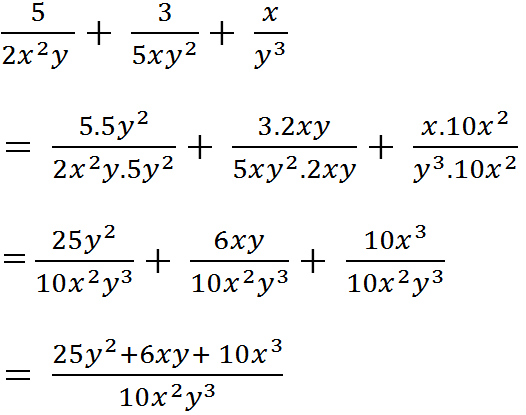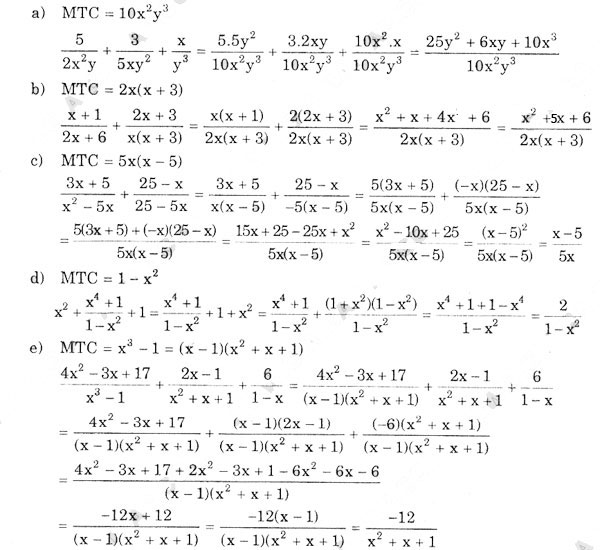Hãy nhập câu hỏi của bạn vào đây, nếu là tài khoản VIP, bạn sẽ được ưu tiên trả lời.

1.
a) \(x\left(x+4\right)+x+4=0\)
\(\Leftrightarrow\left(x+1\right)\left(x+4\right)=0\)
\(\Leftrightarrow\left[{}\begin{matrix}x+4=0\\x+1=0\end{matrix}\right.\Rightarrow\left[{}\begin{matrix}x=-4\\x=-1\end{matrix}\right.\)
b) \(x\left(x-3\right)+2x-6=0\)
\(\Leftrightarrow\left(x+2\right)\left(x-3\right)=0\)
\(\Leftrightarrow\left[{}\begin{matrix}x+2=0\\x-3=0\end{matrix}\right.\Rightarrow\left[{}\begin{matrix}x=-2\\x=3\end{matrix}\right.\)
Bài 1:
a, \(x\left(x+4\right)+x+4=0\)
\(\Leftrightarrow x\left(x+4\right)+\left(x+4\right)=0\)
\(\Leftrightarrow\left(x+4\right)\left(x+1\right)=0\)
\(\Leftrightarrow\left[{}\begin{matrix}x+4=0\\x+1=0\end{matrix}\right.\Leftrightarrow\left[{}\begin{matrix}x=-4\\x=-1\end{matrix}\right.\)
Vậy \(x=-4\) hoặc \(x=-1\)
b, \(x\left(x-3\right)+2x-6=0\)
\(\Leftrightarrow x\left(x-3\right)+2\left(x-3\right)=0\)
\(\Leftrightarrow\left(x-3\right)\left(x+2\right)=0\)
\(\Leftrightarrow\left[{}\begin{matrix}x-3=0\\x+2=0\end{matrix}\right.\Leftrightarrow\left[{}\begin{matrix}x=3\\x=-2\end{matrix}\right.\)
Vậy \(x=3\) hoặc \(x=-2\)

Giải các phương trình
\(a,3x-2=2x-3\)
\(\Leftrightarrow3x-2x=-3+2\)
\(\Leftrightarrow x=-1\)
Vậy pt có tập nghiệm S = { - 1 }
\(b,2x+3=5x+9\)
\(\Leftrightarrow2x-5x=9-3\)
\(\Leftrightarrow-3x=6\)
\(\Leftrightarrow x=-2\)
Vậy pt có tập nghiệm S = { - 2 }
\(c,11x+42-2x=100-9x-22\)
\(\Leftrightarrow11x-2x+9x=100-22-42\)
\(\Leftrightarrow18x=36\)
\(\Leftrightarrow x=2\)
Vậy pt có tập nghiệm S = { - 2 }
\(d,2x-\left(3-5x\right)=4\left(x+3\right)\)
\(\Leftrightarrow2x-3+5x=4x+12\)
\(\Leftrightarrow2x+5x-4x=12+3\)
\(\Leftrightarrow3x=15\)
\(\Leftrightarrow x=5\)
Vậy pt có tập nghiệm S = { - 5 }
\(e,\dfrac{3x+2}{2}-\dfrac{3x+1}{6}=\dfrac{5}{3}+2x\)
\(\Leftrightarrow\dfrac{3\left(3x+2\right)}{6}-\dfrac{3x+1}{6}=\dfrac{5.2}{6}+\dfrac{2x.6}{6}\)
\(\Leftrightarrow9x+6-3x-1=10+12x\)
\(\Leftrightarrow9x-3x-12x=10-6+1\)
\(\Leftrightarrow-6x=5\)
\(\Leftrightarrow x=-\dfrac{5}{6}\)
Vậy pt có tập nghiệm S = { - \(\dfrac{5}{6}\) }
f,\(\dfrac{x+4}{5}-x+4=\dfrac{x}{3}-\dfrac{x-2}{2}\)
\(\Leftrightarrow\dfrac{6\left(x+4\right)}{30}-\dfrac{30x}{30}+\dfrac{4.30}{30}=\dfrac{10x}{30}-\dfrac{15\left(x-2\right)}{30}\)
\(\Leftrightarrow6x+24-30x+120=10x-15x+30\)
\(\Leftrightarrow6x-30x-10x+15x=30-24-120\)
\(\Leftrightarrow-19x=-114\)
\(\Leftrightarrow x=6\)
Vậy pt có tập nghiệm S = { - 6 }
\(g,\left(2x+1\right)\left(x-1\right)=0\)
\(\Leftrightarrow\left[{}\begin{matrix}2x+1=0\\x-1=0\end{matrix}\right.\Leftrightarrow\left[{}\begin{matrix}x=-\dfrac{1}{2}\\x=1\end{matrix}\right.\)
Vậy pt có tập nghiệm S = { \(1;-\dfrac{1}{2}\) }
\(h,\left(x+\dfrac{2}{3}\right)\left(x-\dfrac{1}{2}\right)=0\)
\(\Leftrightarrow\left[{}\begin{matrix}x+\dfrac{2}{3}=0\\x-\dfrac{1}{2}=0\end{matrix}\right.\Leftrightarrow\left[{}\begin{matrix}x=-\dfrac{2}{3}\\x=\dfrac{1}{2}\end{matrix}\right.\)
Vậy pt có tập nghiệm S = { \(-\dfrac{2}{3};\dfrac{1}{2}\) }
\(i,\left(3x-1\right)\left(2x-3\right)\left(2x-3\right)\left(x+5\right)=0\)
\(\Leftrightarrow\left(3x-1\right)\left(2x-3\right)^2\left(x+5\right)=0\)
\(\Leftrightarrow\left[{}\begin{matrix}3x-1=0\\2x-3=0\\x+5=0\end{matrix}\right.\Leftrightarrow\left[{}\begin{matrix}x=\dfrac{1}{3}\\x=\dfrac{3}{2}\\x=-5\end{matrix}\right.\)
Vậy pt có tập nghiệm S = { \(\dfrac{1}{3};\dfrac{3}{2};-5\) }
\(k,3x-15=2x\left(x-5\right)\)
\(\Leftrightarrow3x-15=2x^2-10x\)
\(\Leftrightarrow-2x^2+3x+10x=15\)
\(\Leftrightarrow-2x^2+13x-15=0\)
\(\Leftrightarrow-2x^2+10x+3x-15=0\)
\(\Leftrightarrow\left(x-5\right)\left(3-2x\right)=0\)
\(\Leftrightarrow\left[{}\begin{matrix}x-5=0\\3-2x=0\end{matrix}\right.\Leftrightarrow\left[{}\begin{matrix}x=5\\x=\dfrac{3}{2}\end{matrix}\right.\)
Vậy pt có tập nghiệm S = { \(5;\dfrac{3}{2}\) }
\(m,\left|x-2\right|=3\)
\(\Leftrightarrow\left[{}\begin{matrix}x-2=3\\x-2=-3\end{matrix}\right.\Leftrightarrow\left[{}\begin{matrix}x=5\\x=-1\end{matrix}\right.\)
Vậy pt có tập nghiệm S = { -1; 5 }
\(n,\left|x+1\right|=\left|2x+3\right|\)
\(\Leftrightarrow\left[{}\begin{matrix}x+1=2x+3\\x+1=-2x-3\end{matrix}\right.\)
\(\Leftrightarrow\left[{}\begin{matrix}x=-2\\x=-\dfrac{4}{3}\end{matrix}\right.\)
Vậy pt có tập nghiệm S = { \(-2;-\dfrac{4}{3}\) }
\(j,\dfrac{7x-3}{x-1}=\dfrac{2}{3}\) ĐKXĐ : x≠ 1
\(\Leftrightarrow3\left(7x-3\right)=2\left(x-1\right)\)
\(\Leftrightarrow21x-9=2x-2\)
\(\Leftrightarrow x=\dfrac{7}{19}\) ( t/m )
Vậy pt có tập nghiệm S = { \(\dfrac{7}{19}\) }
đ, ĐKXĐ : x ≠ - 1
\(\dfrac{2\left(3-7x\right)}{1+x}=\dfrac{1}{2}\)
\(\Leftrightarrow4\left(3-7x\right)=1+x\)
\(\Leftrightarrow12-28x=1+x\)
\(\Leftrightarrow-29x=-11\)
\(\Leftrightarrow x=\dfrac{11}{29}\) ( t/m)
Vậy pt có tập nghiệm S = { \(\dfrac{11}{29}\) }
\(y,\dfrac{x+5}{x-5}-\dfrac{x-5}{x+5}=\dfrac{20}{x^2-25}\) ĐKXĐ : \(\left\{{}\begin{matrix}x\ne5\\x\ne-5\end{matrix}\right.\)
\(\Leftrightarrow\dfrac{\left(x+5\right)^2-\left(x-5\right)^2}{\left(x-5\right)\left(x+5\right)}=\dfrac{20}{\left(x-5\right)\left(x+5\right)}\)
\(\Rightarrow20x=20\)
\(\Leftrightarrow x=1\) ( t/m )
Vậy pt có tập nghiệm S = { 1 }
\(\dfrac{1}{x-1}+\dfrac{2}{x+1}=\dfrac{x}{x^2-1}\) ĐKXĐ : \(\left\{{}\begin{matrix}x\ne1\\x\ne-1\end{matrix}\right.\)
\(\Leftrightarrow\dfrac{x+1+2\left(x-1\right)}{\left(x-1\right)\left(x+1\right)}=\dfrac{x}{\left(x-1\right)\left(x+1\right)}\)
\(\Rightarrow3x-1=x\)
\(\Leftrightarrow2x=1\Leftrightarrow x=\dfrac{1}{2}\)( t/m)
Vậy pt có tập nghiệm S = { \(\dfrac{1}{2}\) }

\(\dfrac{x}{x-1}-\dfrac{2x}{x^2-1}=0\left(ĐKXĐ:x\ne\pm1\right)\\ \Leftrightarrow\dfrac{x\left(x+1\right)}{\left(x-1\right)\left(x+1\right)}-\dfrac{2x}{\left(x-1\right)\left(x+1\right)}=0\\ \Rightarrow x^2+x-2x=0\\ \Leftrightarrow x^2-x=0\Leftrightarrow x\left(x-1\right)=0\\ \Rightarrow\left[{}\begin{matrix}x=0\\x-1=0\Rightarrow x=1\left(loại\right)\end{matrix}\right.\)
vậy phương trình có tập nghiệm là S={0}.
b)
\(\dfrac{\left(x+2\right)^2}{2x-3}-1=\dfrac{x^2+10}{2x-3}\left(ĐKXĐ:x\ne\dfrac{3}{2}\right)\)
quy đồng và khử mẫu phương trình trên, ta được:
\(\left(x+2\right)^2+3-2x=x^2+10\\ \Leftrightarrow x^2+4x+4-2x-x^2=10-3\)
\(\Leftrightarrow2x+4=7\Leftrightarrow2x=7-4=3\Rightarrow x=\dfrac{3}{2}\left(loại\right)\)
vậy phương trình đã cho vô nghiệm.
c)\(\dfrac{x+5}{x-5}-\dfrac{x-5}{x+5}=\dfrac{20}{x^2-25}\left(ĐKXĐ:x\ne\pm5\right)\)
\(\Leftrightarrow\dfrac{\left(x+5\right)^2}{\left(x-5\right)\left(x+5\right)}-\dfrac{\left(x-5\right)^2}{\left(x+5\right)\left(x-5\right)}=\dfrac{20}{\left(x+5\right)\left(x-5\right)}\)
\(\Rightarrow\left(x+5\right)^2-\left(x-5\right)^2=20\)
\(\Leftrightarrow x^2+25x+25-x^2+25x-25=20\\ \Leftrightarrow50x=20\Rightarrow x=\dfrac{2}{5}\)
vậy tập nghiệm của phương trình là \(S=\left\{\dfrac{2}{5}\right\}\)
d)\(\dfrac{3x+2}{3x-2}-\dfrac{6}{2+3x}=\dfrac{9x^2}{9x^2-4}\left(ĐKXĐ:x\ne\pm\dfrac{2}{3}\right)\)
quy đồng và khử mẫu phương trình trên, ta được:
\(\left(3x+2\right)^2-6\left(3x-2\right)=9x^2\\ \Leftrightarrow9x^2+12x+4-18x+12-9x^2=0\\ \Leftrightarrow16-6x=0\Leftrightarrow6x=16\Rightarrow x=\dfrac{16}{6}\)
vậy tập nghiệm của phương trình là \(S=\left\{\dfrac{16}{6}\right\}\)
e)\(\dfrac{3}{5x-1}+\dfrac{2}{3-5x}=\dfrac{4}{\left(1-5x\right)\left(5x-3\right)}\left(ĐKXĐ:x\ne\dfrac{1}{5};\dfrac{3}{5}\right)\)
quy đồng và khử mẫu phương trình trên, ta được:
\(3\left(3-5x\right)+2\left(5x-1\right)=4\\ \Leftrightarrow9-15x+10x-2=4\\ \Leftrightarrow-5x=-3\Rightarrow x=\dfrac{3}{5}\left(loại\right)\)
vậy phương trình đã cho vô nghiệm.
f)
\(\dfrac{3}{1-4x}=\dfrac{2}{4x+1}-\dfrac{8+6x}{16x^2-1}\left(ĐKXĐ:x\ne\pm\dfrac{1}{4}\right)\)
quy đồng và khử mẫu phương trình trên, ta được:
\(-3\left(4x+1\right)=2\left(4x-1\right)-8-6x\\ \Leftrightarrow-12x-3=8x-2-8-6x\\ \Leftrightarrow-14x=-7\Rightarrow x=\dfrac{1}{2}\)
vậy phương trình có tập nghiệm là \(S=\left\{\dfrac{1}{2}\right\}\)
g)
\(\dfrac{y-1}{y-2}-\dfrac{5}{y+2}=\dfrac{12}{y^2-4}+1\left(ĐKXĐ:y\ne\pm2\right)\)
quy đồng và khử mẫu phương trình trên, ta được:
\(\left(y-1\right)\left(y+2\right)-5\left(y-2\right)=12+y^2-4\\ \Leftrightarrow y^2+y-2-5y+10=12+y^2-4\\ \Leftrightarrow-4y+8=8\Leftrightarrow-4y=0\Rightarrow y=0\)
vậy phương trình có tập nghiệm là S={0}
h)
\(\dfrac{x+1}{x-1}-\dfrac{x-1}{x+1}=\dfrac{4}{x^2-1}\left(ĐKXĐ:x\ne\pm1\right)\)
quy đồng và khử mẫu phương trình trên, ta được:
\(\left(x+1\right)^2-\left(x-1\right)^2=4\\ \Leftrightarrow x^2+2x+1-x^2+2x-1=4\\ \Leftrightarrow4x=4\Rightarrow x=1\)
vậy phương trình có tập nghiệm là S={1}.
i)
\(\dfrac{2x-3}{x+2}-\dfrac{x+2}{x-2}=\dfrac{2}{x^2-4}\left(ĐKXĐ:x\ne\pm2\right)\)
quy đồng và khử mẫu phương trình trên, ta được:
\(\left(2x-3\right)\left(x-2\right)-\left(x+2\right)=2\\ \Leftrightarrow2x^2-7x+6-x^2-4x-4=2\\ \Leftrightarrow x^2-11x=0\Rightarrow\left[{}\begin{matrix}x=0\\x-11=0\Rightarrow x=11\end{matrix}\right.\)
vậy phương trình có tập nghiệm là S={0;11}
j)
\(\dfrac{x-1}{x^2-4}=\dfrac{3}{2-x}\left(ĐKXĐ:x\ne\pm2\right)\)
quy đồng và khử mẫu phương trình trên, ta được:
\(x-1=-3\left(x+2\right)\Leftrightarrow x-1=-3x-6\\ \Leftrightarrow4x=5\Rightarrow x=\dfrac{5}{4}\)
vậy phương trình có tập nghiệm là \(S=\left\{\dfrac{5}{4}\right\}\)

2)
a) \(\dfrac{1}{x}.\dfrac{6x}{y}\)
\(=\dfrac{6x}{xy}\)
\(=\dfrac{6}{y}\)
b) \(\dfrac{2x^2}{y}.3xy^2\)
\(=\dfrac{2x^2.3xy^2}{y}\)
\(=\dfrac{6x^3y^2}{y}\)
\(=6x^3y\)
c) \(\dfrac{15x}{7y^3}.\dfrac{2y^2}{x^2}\)
\(=\dfrac{15x.2y^2}{7y^3.x^2}\)
\(=\dfrac{30xy^2}{7x^2y^3}\)
\(=\dfrac{30}{7xy}\)
d) \(\dfrac{2x^2}{x-y}.\dfrac{y}{5x^3}\)
\(=\dfrac{2x^2.y}{\left(x-y\right).5x^3}\)
\(=\dfrac{2y}{5x\left(x-y\right)}\)

Câu 1:
\(\text{a) }\dfrac{x^2-xy}{3xy-3y^2}=\dfrac{x\left(x-y\right)}{3y\left(x-y\right)}=\dfrac{x}{3y}\)
\(\text{b) }\dfrac{2ax^2-4ax+2a}{5b-5bx^2}\\ =\dfrac{2a\left(x^2-2x+1\right)}{5b\left(1-x^2\right)}\\ =\dfrac{2a\left(x-1\right)^2}{5b\left(1-x\right)\left(1+x\right)}\\ =-\dfrac{2a\left(x-1\right)^2}{5b\left(x-1\right)\left(1+x\right)}\\ =-\dfrac{2a\left(x-1\right)}{5b\left(x+1\right)}\\ =-\dfrac{2ax-2a}{5bx+5b}\)
\(\text{c) }\dfrac{4x^2-4xy}{5x^3-5x^2y}=\dfrac{4x\left(x-y\right)}{5x^2\left(x-y\right)}=\dfrac{4}{5x}\)
\(\text{d) }\dfrac{\left(x+y\right)^2-z^2}{x+y+z}=\dfrac{\left(x+y+z\right)\left(x+y-z\right)}{x+y+z}=x+y-z\)
\(\text{e) }\dfrac{x^6+2x^3y^3+y^6}{x^7-xy^6}\\ =\dfrac{\left(x^3+y^3\right)^2}{x\left(x^6-y^6\right)}\\ =\dfrac{\left(x^3+y^3\right)^2}{x\left(x^3-y^3\right)\left(x+y\right)^3}\\ =\dfrac{x^3+y^3}{x\left(x^3-y^3\right)}\\ =\dfrac{x^3+y^3}{x^4-xy^3}\)
Câu 3:
\(\text{ a) }\dfrac{\left(a+b\right)^2-c^2}{a+b+c}=\dfrac{\left(a+b+c\right)\left(a+b-c\right)}{a+b+c}=a+b-c\)
\(\text{b) }\dfrac{a^2+b^2-c^2+2ab}{a^2-b^2+c^2+2ac}\\ =\dfrac{\left(a^2+2ab+b^2\right)-c^2}{\left(a^2+2ac+c^2\right)-b^2}\\ =\dfrac{\left(a+b\right)^2-c^2}{\left(a+c\right)^2-b^2}\\ =\dfrac{\left(a+b+c\right)\left(a+b-c\right)}{\left(a+c+b\right)\left(a+c-b\right)}\\ =\dfrac{a+b-c}{a-b+c}\)
\(\text{c) }\dfrac{2x^3-7x^2-12x+45}{3x^3-19x^2+33x-9}\\ =\dfrac{2x^3-x^2-6x^2+3x-15x+45}{3x^3-10x^2-9x^2+3x+30x-9}\\ =\dfrac{\left(2x^3-x^2-15x\right)-\left(6x^2-3x-45\right)}{\left(3x^3-10x^2+3x\right)-\left(9x^2-30x+9\right)}\\ =\dfrac{x\left(2x^2-x-15\right)-3\left(2x^2-x-15\right)}{x\left(3x^2-10x+3\right)-3\left(3x^2-10x+3\right)}\\ =\dfrac{\left(x-3\right)\left(2x^2-x-15\right)}{\left(x-3\right)\left(3x^2-10x+3\right)}\\ =\dfrac{\left(x-3\right)\left(2x^2-6x+5x-15\right)}{\left(x-3\right)\left(3x^2-9x-x+3\right)}\\ =\dfrac{\left(x-3\right)\left[\left(2x^2-6x\right)+\left(5x-15\right)\right]}{\left(x-3\right)\left[\left(3x^2-9x\right)-\left(x-3\right)\right]}\\ =\dfrac{\left(x-3\right)\left[x\left(x-3\right)+5\left(x-3\right)\right]}{\left(x-3\right)\left[3x\left(x-3\right)-\left(x-3\right)\right]}\\ =\dfrac{\left(x-3\right)\left(x-3\right)\left(x+5\right)}{\left(x-3\right)\left(x-3\right)\left(3x-1\right)}\\ =\dfrac{x+5}{3x-1}\)

a: A=[(3x^2+3-x^2+2x-1-x^2-x-1)/(x-1)(x^2+x+1)]*(x-2)/2x^2-5x+5
=(x^2+x+1)/(x-1)(x^2+x+1)*(x-2)/2x^2-5x+5
=(x-2)/(2x^2-5x+5)(x-1)

\(1.\)
\(a.\)
\(\dfrac{8}{\left(x^2+3\right)\left(x^2-1\right)}+\dfrac{2}{x^2+3}+\dfrac{1}{x+1}\)
\(=\dfrac{8}{\left(x^2+3\right)\left(x^2-1\right)}+\dfrac{2\left(x^2-1\right)}{\left(x^2+3\right)\left(x^2-1\right)}+\dfrac{1\left(x-1\right)\left(x^2+3\right)}{\left(x^2-1\right)\left(x^2+3\right)}\)
\(=\dfrac{8}{\left(x^2+3\right)\left(x^2-1\right)}+\dfrac{2x^2-2}{\left(x^2+3\right)\left(x^2-1\right)}+\dfrac{x^3-x^2+3x-3}{\left(x^2-1\right)\left(x^2+3\right)}\)
\(=\dfrac{8+2x^2-2+x^3-x^2+3x-3}{\left(x^2+3\right)\left(x^2-1\right)}\)
\(=\dfrac{x^3+x^2+3x+3}{\left(x^2+3\right)\left(x^2-1\right)}\)
\(=\dfrac{x^2\left(x+1\right)+3\left(x+1\right)}{\left(x^2+3\right)\left(x^2-1\right)}\)
\(=\dfrac{\left(x^2+3\right)\left(x+1\right)}{\left(x^2+3\right)\left(x^2-1\right)}\)
\(=x-1\)
\(b.\)
\(\dfrac{x+y}{2\left(x-y\right)}-\dfrac{x-y}{2\left(x+y\right)}+\dfrac{2y^2}{x^2-y^2}\)
\(=\dfrac{x+y}{2\left(x-y\right)}-\dfrac{x-y}{2\left(x+y\right)}+\dfrac{2y^2}{\left(x-y\right)\left(x+y\right)}\)
\(=\dfrac{\left(x+y\right)^2}{2\left(x^2-y^2\right)}-\dfrac{\left(x-y\right)^2}{2\left(x^2-y^2\right)}+\dfrac{4y^2}{2\left(x^2-y^2\right)}\)
\(=\dfrac{x^2+2xy+y^2}{2\left(x^2-y^2\right)}-\dfrac{x^2-2xy+y^2}{2\left(x^2-y^2\right)}+\dfrac{4y^2}{2\left(x^2-y^2\right)}\)
\(=\dfrac{x^2+2xy+y^2-x^2+2xy-y^2+4y^2}{2\left(x^2-y^2\right)}\)
\(=\dfrac{4xy+4y^2}{2\left(x^2-y^2\right)}\)
\(=\dfrac{4y\left(x+y\right)}{2\left(x^2-y^2\right)}\)
\(=\dfrac{2y}{\left(x-y\right)}\)
Tương tự các câu còn lại



a) \(A = \frac{2x^2 - 16x+43}{x^2-8x+22}\) = \(\frac{2(x^2-8x+22)-1}{x^2-8x+22}\) = \(2 - \frac{1}{x^2-8x+22}\)
Ta có : \(x^2-8x+22 \) = \(x^2-8x+16+6 = ( x-4)^2 +6 \)
Vì \((x-4)^2 \ge 0 \) với \( \forall x\in R\) Nên \(( x-4)^2 +6 \ge 6 \)
\(\Rightarrow \) \(x^2-8x+22 \) \( \ge 6\)\(\Rightarrow \) \(\frac{1}{x^2-8x+22} \) \(\le \frac{1}{6}\) \(\Rightarrow \) - \(\frac{1}{x^2-8x+22} \) \(\ge - \frac{1}{6}\)
\(\Rightarrow \) A = \(2 - \frac{1}{x^2-8x+22}\) \( \ge 2-\frac{1}{6}\) = \(\frac{11}{6}\) Dấu "=" xảy ra khi và chỉ khi x=4
Vậy GTNN của A = \(\frac{11}{6}\) khi và chỉ khi x=4